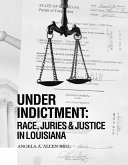With a critical lens, the book examines the role of local authorities in shaping court decisions and highlights the discriminatory practices and biases that persist within the judicial system. It explores the intersectionality of race and gender, socioeconomic factors, and immigration status, providing a nuanced understanding of the multiple forms of injustice faced by marginalised communities. Through personal stories of victims, the book amplifies the voices of those who have experienced the devastating effects of judicial injustice, emphasizing the trauma and resilience of survivors.
However, "Judicial Injustice: Unveiling the Power Divide" also offers hope and a path towards a more just future. It presents legal remedies, strategies, and community activism as means to challenge and reform the judicial system. The book advocates for transparency, accountability, and the dismantling of the power divide within the courts. It emphasises the importance of education and awareness in combating judicial injustice, promoting cultural competence, and empowering communities through knowledge. Ultimately, this book calls for collective action and policy recommendations to create equal access to justice and foster fairness and equity in courtrooms.
Dieser Download kann aus rechtlichen Gründen nur mit Rechnungsadresse in A, B, CY, CZ, D, DK, EW, E, FIN, F, GR, H, IRL, I, LT, L, LR, M, NL, PL, P, R, S, SLO, SK ausgeliefert werden.









